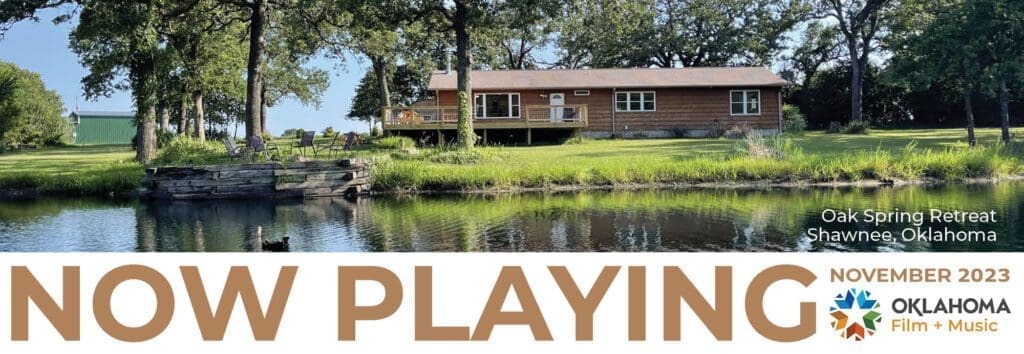Jenn Ross is the founder of 405 Post Production Services, LLC, established in 2019 and located in Edmond, Oklahoma, though has had a presence across the United States. She holds a Bachelors of Music & Business Administration from Oklahoma City University. She worked in public accounting for 13 years before transitioning to the film and television industry upon joining an independent film studio, and, eventually, becoming a freelance production accountant. She is a member of IATSE 484 and currently serves as a board member of Oklahoma Motion Picture Alliance. Ross’ Oklahoma credits include “I can Only Imagine,” “Infamous,” “13 Minutes,” “Reagan,” “God’s Not Dead: We the People,” “Unexpected,” “Seven Cemeteries,” “Help Wanted,” “Black Bags,” “Faculty Lounging,” “The Line” and “Tulsa King.”
How did you get started in the film industry?
I worked at a local, mid-sized public accounting firm located near downtown Oklahoma City for 13 years until I left to join LD Entertainment, a small independent studio, in 2016 as a Senior Accountant in its corporate office. It was here that I was first introduced to the inner workings of the film and television industry with my core responsibilities to be the primary liaison and coordinator between operations for corporate and its productions. When the “Oklahoma Compete with Canada Act” went through its transition in 2019, I saw an opportunity to start my company, 405 Post Production Services, LLC, to get closer to the action by being part of production accounting teams and performing rebate consulting and submissions. I attended deadCenter Film Festival in June 2019 to further commit myself to this endeavor and promote my services by making connections with the local film/TV community. By July 1, 2019, I had my first show as a Key Production Accountant. I resigned from my corporate job to dive head first into the world of production accounting, and I’ve never looked back.
Did you have any formal education or training related to the film industry before starting?
I earned a Music Business Degree from Oklahoma City University, which provided me some crossover knowledge, but actual experience has really been the key for me. Until I joined LD Entertainment, my understanding of the industry was really limited to what the average movie-goer perceives from the outside. Through my work at LD Entertainment, I saw firsthand what it takes to produce and run a show.
Did you have any formal education or training related to your specific department on-set?
Aside from what I was able to use from my Music Business education at Oklahoma City University, I took a course offered by John Gaskin, a veteran of film and TV production accounting, during my time at LD Entertainment. I was also taught by Trevanna Post, a post-production accounting house in L.A. Other education or training was purely self-taught through books and other materials, and on-the-job experience.
What are some of your most recent successes (credits or accolades) related to your career in the industry?
Since going freelance in mid-2019, I have completed 16 feature films as a Key Production Assistant (or 1st/2nd Assistant) and approximately 13 Oklahoma rebate submissions. I have also had the privilege of teaching a course, Production Accounting 101, at The Oklahoma Film & TV Academy.
What has your career in the state’s film industry taught you?
It has shown me how amazing the film and TV community is here in Oklahoma. It is a tight-knit community where everyone works so hard to help build up the industry here in our state and provide unwavering support to one another.
What is the highlight of your career thus far?
I’ve been thrilled to have worked with the major studios, including Netflix, Lionsgate, Amazon, Viacom/CBS (AKA Paramount) and Big Indie, which allowed accountants to work remotely during the COVID-19 pandemic.
What is your favorite aspect of working in Oklahoma’s film and television industry?
My favorite part has easily been working and networking with the people here in Oklahoma. It’s been amazing to see how the industry has continued to blossom in the state and all we have to offer in terms of talent.
What’s the best piece of advice you have for someone starting their career in Oklahoma’s film industry?
Don’t be afraid to take a risk. Opportunity in Oklahoma’s film and TV industry is out there waiting to be found. All you have to do is pay attention, learn everything you can and enjoy your journey along the way. And most importantly, believe in yourself.
How does someone in your field/department best promote/market themselves to those hiring in your industry?
Always be true to your word. Follow through even when the going gets tough. Network with your peers and clients, and communicate. It’s essential to be a go-getter in this field, but it’s even more important to never oversell and under deliver.
Are there any local film organizations, resources or events that have been beneficial to you in your career?
The Oklahoma Film + Music Office, The Oklahoma Film & TV Academy (OFTA), deadCenter Film Festival, Simply Indie Film Festival and Oklahoma Motion Picture Alliance (OKMPA). I recently accepted a position as a member of OKMPA’s Board of Directors and my involvement in this organization has been exciting. Our members are from a variety of industries here in Oklahoma and they’re all dedicated to support the growth of our local film community. I’m very proud to be a part of those efforts.
What’s the one item you can’t live without on-set, and why?
Multiple computer monitors, mini Coke-Cola and Slim Jim’s for energy and protein.
Would your career be impacted without the state’s film incentive program? If so, how?
My career would be greatly impacted if we did not have a film incentive to offer prospective producers. I enjoy being in my home state with my family who support me, and the people I have grown to love in the local film community.
Where do you see yourself – AND – Oklahoma’s film industry in the next five years?
I see myself continuing my growth in this extraordinary career and doing my part to help build the film and TV industry here in Oklahoma, whatever that part may be. In particular, I’d like for Oklahoma to be recognized as one of the top five desired places to film, not only because of our diverse landscape and excellent local talent, but also because of a competitive film incentive.
What are you working on now or next?
“Tulsa King”


